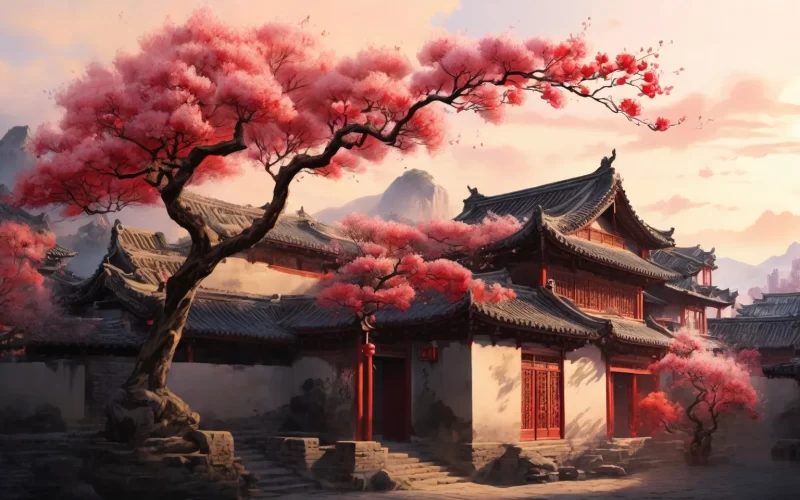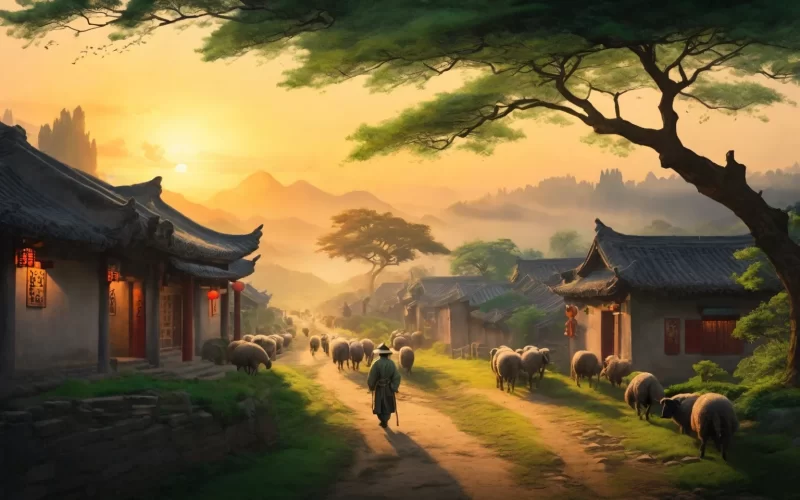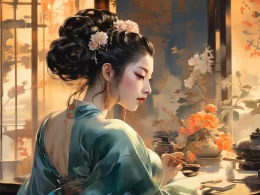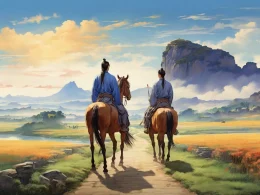You have just come from our native place,dear fellow,
What happened there you should have known.
On the day you came,before your gorgeous window,
Were the winter plums in blossom grown?
Original Poem
「杂诗」
王维
君自故乡来,应知故乡事。
来日绮窗前,寒梅著花未。
Interpretation
Composed during the High Tang period, this work is the second of Wang Wei's "Three Miscellaneous Poems," expressing the profound nostalgia of a long-time wanderer for his homeland. While the entire set shares unified themes, this particular poem stands out for its genuine language and deep emotional resonance. Wang Wei masterfully conveys complex emotions through deceptively simple verses, using immediate scenes and casual encounters to express inner contemplation, achieving his signature artistic realm where "poetry contains painting, and painting embodies feeling."
First Couplet: "君自故乡来,应知故乡事。"
Jūn zì gùxiāng lái, yīng zhī gùxiāng shì.
You've come from my hometown—you must know how things are there.
The opening line's natural, conversational tone ("You've come from my hometown") gives way to childlike insistence in the second half ("you must know"). The double repetition of "hometown" creates deliberate linguistic abruptness that reveals the speaker's emotional agitation upon meeting a fellow townsman. This phrasing also betrays unconscious psychological defense—an anxious preemptive strike against potential disappointment by insisting "you must know."
Second Couplet: "来日绮窗前,寒梅著花未?"
Láirì qǐ chuāng qián, hán méi zhuó huā wèi?
That day you left—by my carved window, had winter plum blossoms opened yet?
Rather than asking after family, the poet inquires about plum blossoms by his window—a subtle emotional transference. This seemingly simple question carries deep memories of shared life: perhaps these plum trees witnessed winters spent with loved ones, or perhaps they represent the clearest, tenderest memory of home. The "carved window and winter plum" create a classically serene image that silently conveys profound longing.
Holistic Appreciation
Though brief (just twenty characters), this poem resonates with endless nostalgic depth. Using a dialogic approach, it vividly captures a wanderer's instinctive excitement upon encountering someone from home. The concluding line about plum blossoms appears casual but actually reveals the heart's true concern. Without ever directly mentioning "homesickness," every line pulses with nostalgia—particularly the abruptly ending question that leaves reverberating aftertones. The plum blossom becomes both emotional vessel and spiritual anchor, transforming into the very embodiment of homesickness.
Artistic Merits
The poem's most striking feature is its plainspoken naturalism—seemingly artless yet meticulously crafted. Skillful repetition (like the dual "hometown") intensifies emotional transmission, while the winter plum symbolizes and concretizes abstract longing, achieving perfect scene-emotion fusion. Furthermore, its extensive use of colloquial language achieves the aesthetic ideal of "lotus rising from clear water, natural and unadorned," making it a paradigm of Tang five-character quatrains that incorporate everyday speech to express authentic feeling.
Philosophical Insight
This poem teaches that genuinely moving emotions often require no elaborate exposition—simple, truthful expressions like "have the flowers bloomed?" can convey infinite meaning. It reveals how memories of "home" reside not in grand narratives but in small details: a plum tree, a window frame, a hint of spring chill. This "microcosm-to-macrocosm" approach—channeling emotion through objects—remains one of traditional poetry's most poignant expressive modes, demonstrating how minimalism can articulate maximal feeling. The winter plum's quiet resilience ultimately symbolizes how nostalgia preserves our deepest connections across time and distance.
Poem translator
Kiang Kanghu
About the poet

Wang Wei (王维), 701 - 761 A.D., was a native of Yuncheng, Shanxi Province. Wang Wei was a poet of landscape and idylls. His poems of landscape and idylls, with far-reaching images and mysterious meanings, were widely loved by readers in later generations, but Wang Wei never really became a man of landscape and idylls.











